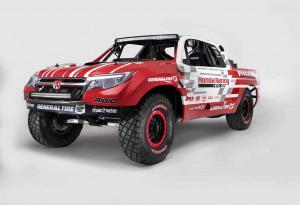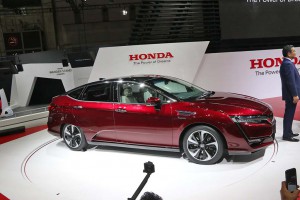Honda quarterly earnings rose 7%, to 127.7 billion yen, or $1 billion, from a year earlier despite the hefty cost of repairing vehicles using potentially deadly Takata aibags.
The third-largest of the Japanese makers released results for the July-September period, the second in its fiscal year, a day after it announced it would no longer work with Takata, long one of its most important suppliers under the so-called keiretsu system.
“We have become aware of evidence that suggests that Takata misrepresented and manipulated test data for certain air bag inflators,” Honda explained on Tuesday. “Honda expects its suppliers to act with integrity at all times, and we are deeply troubled by this apparent behavior by one of our suppliers.”
Earlier this year, the U.S. National Highway Traffic Safety Administration ordered the recall of about 20 million vehicles using Takata systems. Recalls related to Takata airbag inflators cost Honda 87.5 billion yen, or $723 million.

Honda's Baja racer is a thinly disguised version of the reborn, 2017 Ridgeline pickup debuted this week at the SEMA Show in Las Vegas.
(Honda reveals hydrogen car plans with debut of Clarity fuel-cell vehicle. Click Here for more.)
Older vehicles using Takata airbags inflators have developed an unusually high tendency to over-aggressively inflate following a crash, a problem that can cause shrapnel to burst into the passenger compartment. The majority of the eight deaths linked to the problem have occurred in Honda vehicles, even though Takata’s supplemental restraints were used by a dozen different brands.
Honda has had other safety related problems, the automaker fined earlier this year for under-reporting deaths and injuries occurring in its vehicles under NHTSA’s required Early Warning Report system.
Honda’s various problems led to a shake-up in its top management this year, its new CEO Takahiro Hatchigo announcing a “back-to-basics” turnaround plan.
(For more on that plan, Click Here.)
In spite of its safety problems, Honda still managed to post a 16% increase in sales for the latest quarter, at 3.6 billion yen, or $30 billion.
Honda’s earnings compared with revised 2014 numbers because Honda has since adapted International Financial Reporting Standards meant to improve corporate transparency.
As with its Japanese competitors, Honda experienced a slowdown in sales in China, now the world’s largest automotive market. But it saw a surge in demand in the U.S., especially for crossover-based products like the Pilot and CR-V utility vehicles.
Honda’s second-quarter upturn comes a day after Nissan Motor Co. reported a 38% jump in sales for the July-September quarter. Toyota Motor Co. is expected to report its own profit numbers on Thursday.
(Honda’s new Baja racer offers first look at next-generation Ridgeline pickup. Click Here to check it out.)

